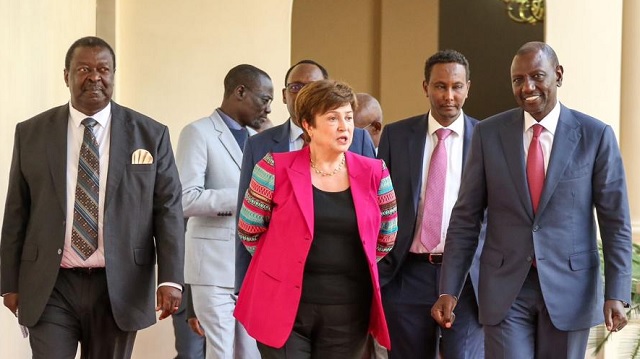Kenya receives nearly $1 billion in additional funding from the IMF to alleviate the strain on government finances.
Extended Fund Facility and Extended Credit Facility for Kenya extended to 48 months, providing an immediate payout of $415.4 million.
The IMF also approved a new 20-month agreement of approximately $551.4 million to support Kenya’s climate change adaptation efforts.
The International Monetary Fund’s executive board gave its approval on Monday to almost $1 billion in additional money for Kenya, which may relieve strain on the country’s government finances in East Africa’s largest economy.
The Extended Fund Facility and Extended Credit Facility for Kenya were extended to 48 months from 38 months, according to the IMF, after the board concluded the fifth evaluation. This allowed for an immediate payout of roughly $415.4 million and gave Kenya additional time to execute reforms.
Additionally, it authorized a new 20-month agreement worth approximately $551.4 million under the IMF’s Resilience and Sustainability program that would aid Kenya’s efforts to adapt to climate change.
Despite experiencing the worst drought in decades and a difficult external environment, the IMF stated that Kenya has made considerable progress in implementing economic reforms.
The moves taken on Monday, according to IMF Deputy Managing Director Antoinette Sayeh, will enable Kenyan authorities to continue addressing such issues, maintain market confidence, foster development, and progress continuing reforms.
“Kenya’s economy has been resilient despite the worst drought in many decades and a difficult external environment,” she relayed via a statement. The arrangements “continue to support the authorities’ efforts to address emerging challenges to sustain macroeconomic stability and market confidence, promote growth, and advance ongoing reforms,” she added.
The fiscal 2023–2024 budget for Kenya and the 2023 Finance Act, according to her, are “crucial steps” that must be taken in order to support continued consolidation efforts, lessen debt risks, and safeguard social and development expenditures. A “prudent debt policy” and sustained attempts to give priority to concessional loans were also necessary because of the tighter financing circumstances, she added.
The most recent numbers will bring the total ECF/EFF payouts to around $2 billion. The administration of President William Ruto has pledged to strengthen Kenya’s finances by increasing income and reducing borrowing. According to the National Treasury, Kenya’s national debt was 9.63 trillion shillings ($68.1 billion) in April, or two-thirds of its GDP. More than half of tax revenue is used to pay debt servicing charges.













